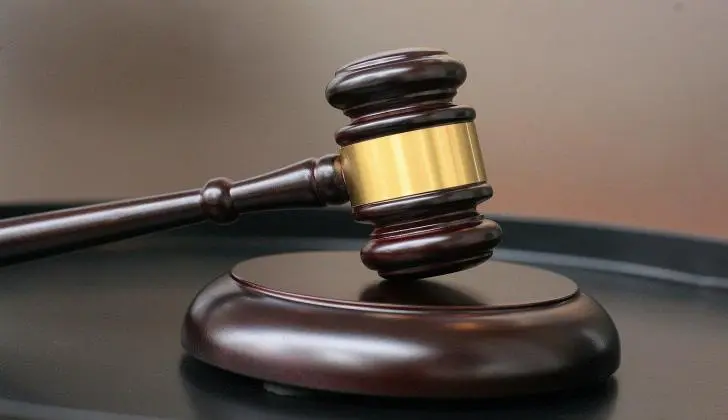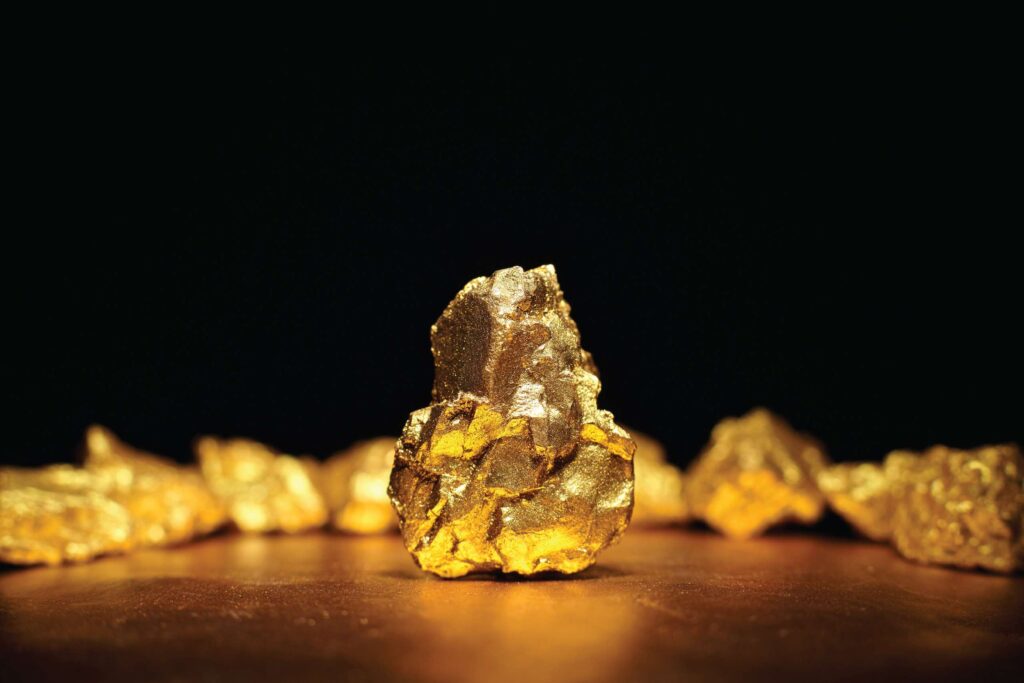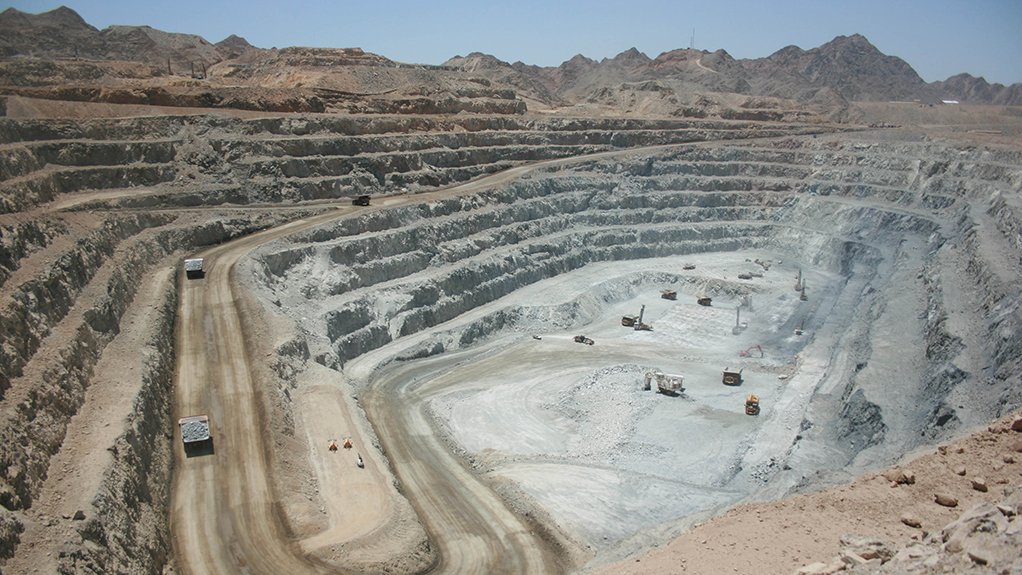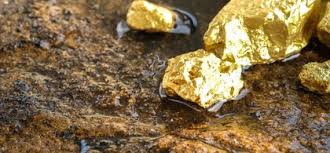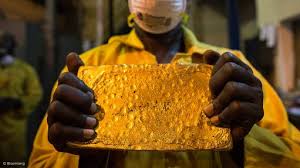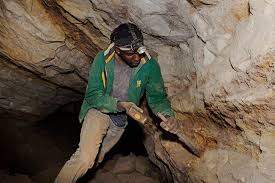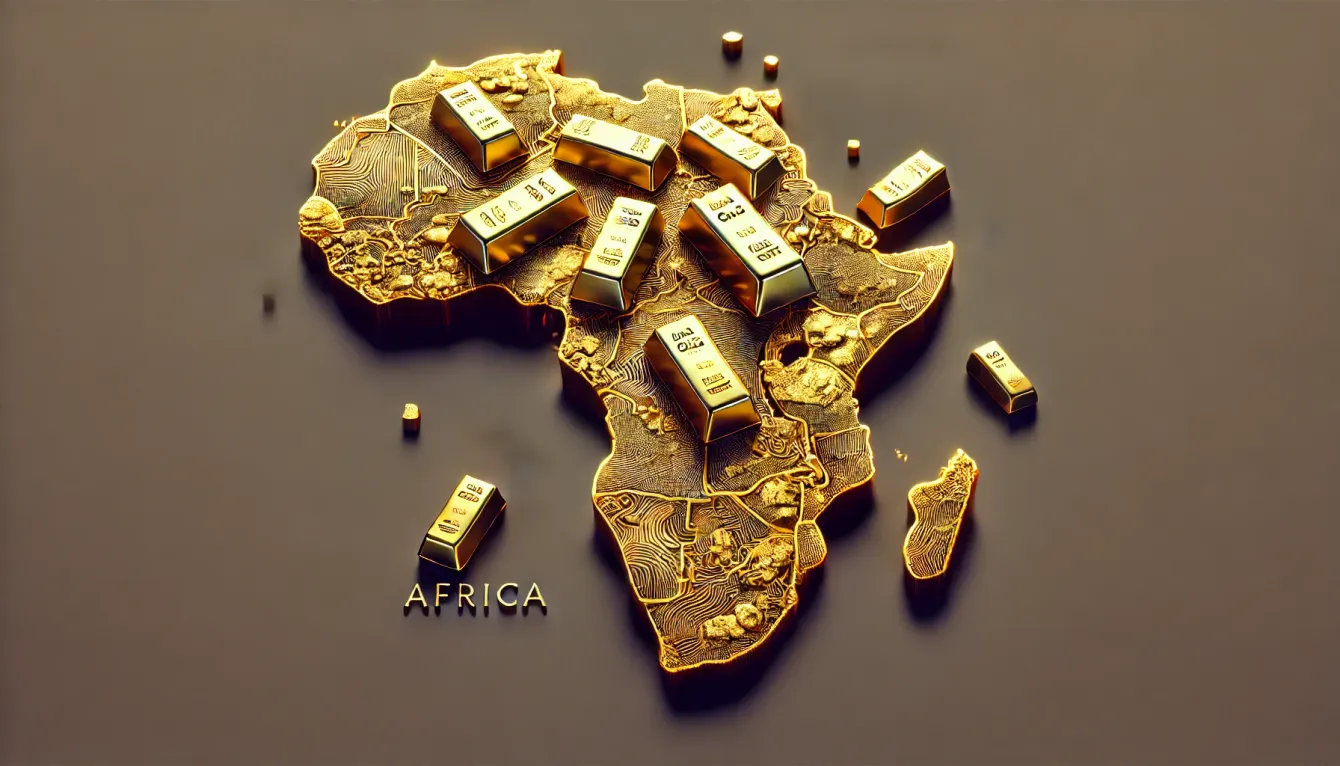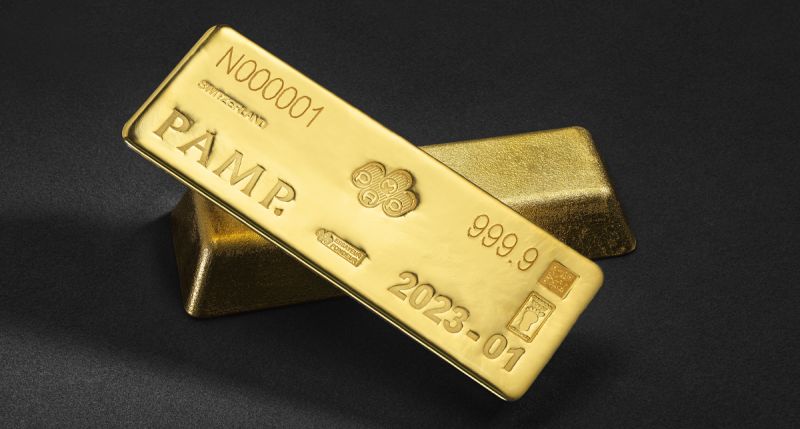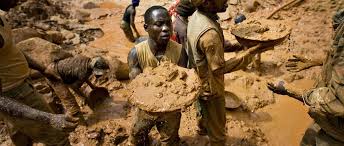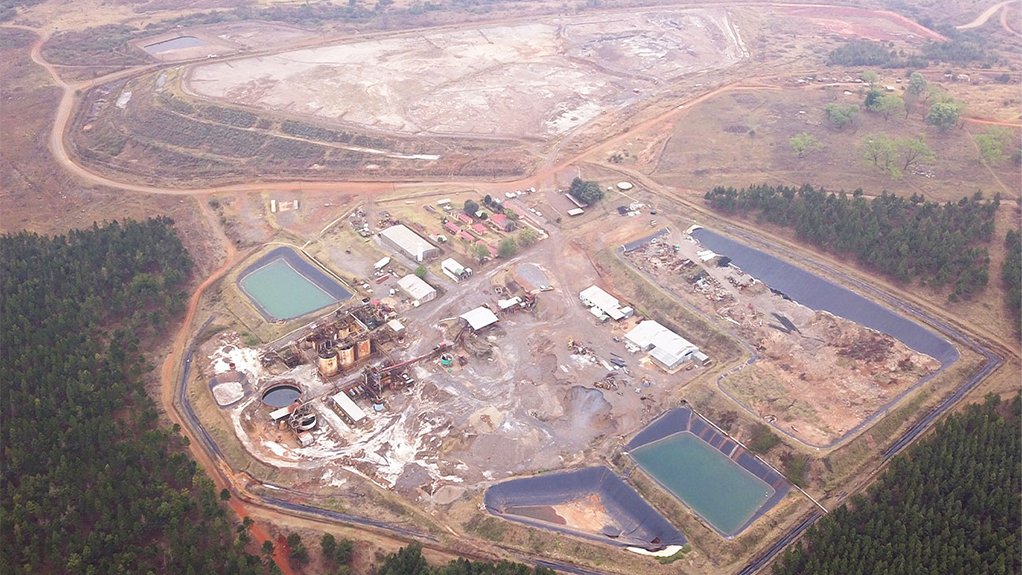Precious Metals

In Ghana, illegal gold mining is bringing jobs and environmental grief
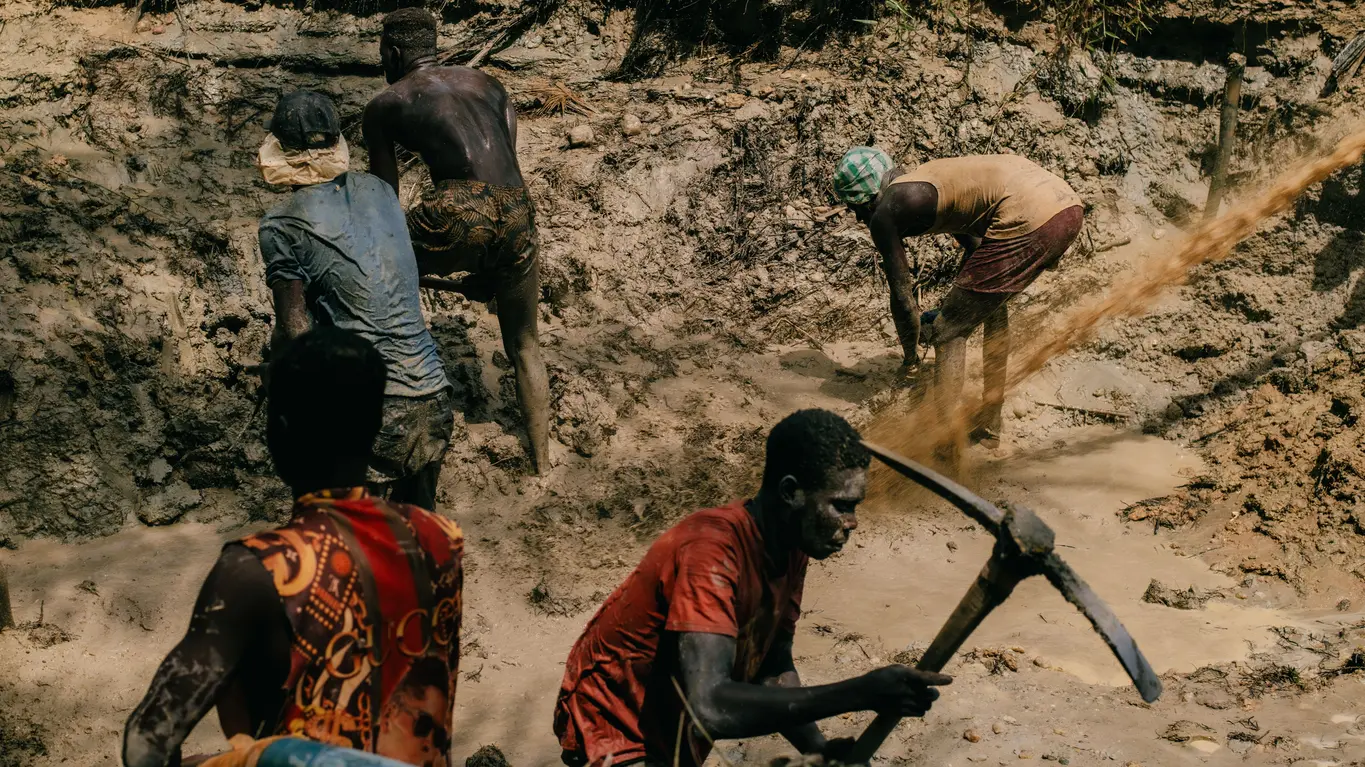
«These here,» says Chairman Ghana, «are the pickings of the last few days.» He holds a box in his hand in which a dozen gold nuggets gleam. They are worth the equivalent of almost 2,000 Swiss francs (nearly $2,300), he says.
The man they call Chairman Ghana is actually named Oduro Dankwa. But it is for good reason that he has a nickname that sounds as if he were the president of the country. Gold has made him one of the most powerful men in the village.
Chairman Ghana shows off the gold from his mines.
Two years ago, Oduro Dankwa, also known as Chairman Ghana (left), made money by selling gasoline Then he went into the gold business.
Just two years ago, Dankwa earned his living selling gasoline on the main road in the village of Nyenase, which can be crossed in three minutes. Then he went into the business that has turned the village upside down in recent years.
Nyenase, which is home to about 6,000 people, is today a village in a frenzy. Next to the town, a crater-pocked landscape is eating its way further and further through the forest and farmers' fields. These are the mining pits of the «galamsey,» as they call illegal gold mining in Ghana.
«Galamsey» has given young men work here where there was none before. It has allowed villagers to build new houses and stores. It has brought motorcycles roaring through the village, and allowed people to buy their own cars. It has meant that Dankwa now runs six mines, owns four stores and has more than 60 people working for him.
Hundreds of thousands work in illegal gold mines
Illegal mining takes place in almost all parts of Ghana, not just in this village. It accounts for around 40% of gold mining, with Ghana the country that produces the most gold in Africa, and Africa being the continent that produces the most gold in the world. Hundreds of thousands of Ghanaians are today working in illegal mines, because gold is a phenomenal business. The price of the precious metal has doubled in only the past five years.
However, the gold rush is also exacting a high price. In October, thousands of people demonstrated in Ghana's capital, Accra. They accused the government of allowing illegal gold mining to grow out of control. So much so that the state water authority reports that two-thirds of the country's water sources have now been contaminated by heavy metals, and will remain this way for dozens or even hundreds of years. These substances, including mercury, lead and cyanide, are used in illegal gold mining processes. By 2030, the country may have to begin importing drinking water.
Demonstrators also achieved something rare in Africa, forcing an environmental issue to the front of the stage in an election campaign. In presidential elections held in Ghana on Dec. 7, opposition party candidate and former President John Dramani Mahama defeated governing party candidate Vice President Mahamudu Bawumia. Election observers said Bawumia's loss came in part because his party's government had prioritized short-term economic gains over efforts to secure the country's future – in part by failing to crack down on the illegal gold mining and its environmental consequences.
Once called the «Gold Coast»
Gold has been mined in Ghana for hundreds of years. Colonizers called the region the «Gold Coast» because of its resource wealth. But illegal mining has taken off only in the past decade, bringing with it a long list of negative consequences. The boom has been driven by foreign entrepreneurs, mainly Chinese, who have imported excavators and other heavy machinery to areas where Ghanaians had previously dug with shovels or even by hand. The practice has been further boosted by a government that has granted licenses with increasing liberality. The authorities awarded 1,700 official mining concessions between 2016 and 2024, compared to 57 in the previous 20 years. Mine operators often have a legal license – and run illegal mines alongside their approved facility.
Until a few years ago, Nyenase was an ordinary farming village with fields of cocoa and cassava, five schools, and a dozen churches. Three years ago, gold mining picked up speed here as well. Dankwa, who previously ran a small gas station, initially encountered the miners as customers. They needed fuel for their generators. «Then I realized that I could earn more if I invested in ‹galamsey› myself,» he says. That was in spring 2023. He took over the mine of an acquaintance who owed him money – and quickly became a key figure in the local gold business.
In the morning, Chairman Ghana still sells gasoline on the main road. Pictured: cabdrivers wait to take generators to the illegal mines.
Young miners in the village before they start their day's work.
Early in the morning, young men dressed like rappers in XXL clothes come to Dankwa's store. He gives them the gasoline they need in the mines, as well as money for food – up to the equivalent of 10 Swiss francs a day for this alone, which is more than most Ghanaians earn in a day.
Shortly after nine o'clock, Dankwa, always with a wad of banknotes in hand and a cellphone at his ear, puts on bright yellow protective gear, gets on a motorcycle and heads off to inspect his mines. The drive past cocoa and cassava fields takes about 15 minutes.
Hard work and painkillers
The young men in the mines have taken off their shirts and are standing at the bottom of the craters, their bodies glistening with mud and sweat. They digging by hand, with shovels and picks. They loosen the sludge containing the gold, pump it out of the pits with thick hoses and let it flow down wooden chutes on which they have draped door mats. The idea is that the gold will get caught in their bristles
«Galamsey» miners at Nyenase. Digging for gold is brutal work.
Miners in the morning before work. A crater-pocked landscape is eating away at the village.
This is brutal work. Generators roar without a break. Some of the workers are only 15 years old. Many of them keep themselves awake with tramadol, a highly addictive painkiller.
Dankwa hurries from one pit to the next, his bright yellow protective clothing billowing behind him like that of a general inspecting the battlefield. At one point, he pauses briefly, turns around and says: «All of this is mine.»
Mercury-contaminated soil
Once upon a time this was a tropical green paradise. Today it is a mud-colored hell. In some places, rivulets of mercury are meandering in purplish stripes across the ground.
This is the environmental price that Nyenase is paying for these young men to have work. Illegal gold mining is poisoning what was once fertile land. The chemicals used by the miners also cause respiratory diseases, skin rashes, diarrhea and, over the long term, cancer. At the local health clinic, the nurse says: «They earn money. Then they come here and spend it to get treatment. Does that make sense?»
A mine worker holds mercury in his bare hand. The highly toxic heavy metal is used to bind the gold.
Many mine workers regularly take tramadol, a painkiller that makes the agony bearable.
The gold is also poisoning the local society. A teacher says: «They no longer respect us.» An ordinary mine worker can earn as much in a week as a teacher does in a month. The teacher says he often sees former pupils strolling through the village. Instead of coming to class, they are going to work in the mines. He says he knows underage girls who get pregnant because they are impressed by the money that the young men are throwing around.
But no group in the village has been hit harder than the farmers. They once drove the economy here. Now their children would rather work in the mines than plant cocoa. The farmers themselves can no longer find people to help in the fields, because employees demand wages comparable to those earned by miners.
Landowners earn more from mines than from farmers
Francis Sam is one of the spokespersons for the farmers in Nyenase. He once worked at a bank, then became a farmer because he wanted to be his own boss. During a morning interview, he wants to demonstrate how gold mining is jeopardizing his livelihood. He rides his motorcycle along the same path that Chairman Ghana took. He overtakes young men carrying drinks and shovels to the mines. The 61-year-old Sam is generally a cheerful man, but today he is angry.
Francis Sam became a farmer in order to be his own boss. Now, piece by piece, he is losing his fields to the mines. In the background, gold prospectors are preparing for work.
Mine pits are devouring trees and farmers' social status.
«Do you see how they’ve destroyed my fields?» he asks, gesturing at the mine craters with his machete. Sam says the owner of the land is gradually ceding the leased fields to the gold prospectors. Here, that means to Dankwa, or Chairman Ghana. He pays better than the farmers.
Sam has been farming here for two decades, cultivating cocoa trees and oil palms. Previously there were almost 500 palm trees spaced across three hectares, some of which he had planted himself. Now, mine pits are swallowing up more and more of the trees. As they fall, so does the farmers' social status.
Nana Nkwantabisa, the village head in Nyenase, says: «I try to talk to the miners, to explain to them that the money they earn is short-lived. But money is powerful.» What Nkwantabisa doesn't say is that he too has succumbed to the power of money. The gold-seekers need his approval to convert fields into mines, and he is earning commissions.
Illegal gold mining in Ghana has so effectively been able to damage the environment and disrupt communities because authorities at all levels are benefiting – from traditional village heads to politicians in Accra, the country's capital.
Francis Sam and two «galamsey» workers. Some of the trees that are now falling victim to the mines were planted by Sam himself.
Birds flying low over the Pra River near Nyenase. Rivers in Ghana have changed color because of illegal gold mining.
The failure of the state
In the capital, influential politicians are pulling strings in the illegal gold business. Some of the details have been documented in a report that the government initially tried to keep under wraps, but which then became public. Some observers claim that Ghana functions like a narco-state in which the drug business shapes politics.
Oliver Barker-Vormawor is a Ghanaian lawyer and activist who helped organize the protests against illegal gold mining in recent months. As a result of this activity, he was put in prison for several weeks, not for the first time. During an interview in his office in Accra, he says: «Illegal gold mining is the result of the state's failure to create economic prospects.»
Like most African countries, Ghana has a young population that is struggling with high unemployment rates. The country is also experiencing a severe economic crisis. The government cannot afford to deprive hundreds of thousands of young people of the jobs and income they have found in the mines. This is one reason why the government's response to the protests was no more than half-hearted.
«As long as it's gold, we'll buy»
«Galamsey» workers sell their gold in the village of Twifo Praso, not far from Nyenase. There, dealers sit in small stores with special high-precision scales, not caring that the gold was mostly mined illegally. One of them says: «As long as it's gold, we'll buy.»
The gold is sent abroad via a number of intermediaries, with much of it ending up in Dubai. Switzerland, which imposes stricter regulations than the United Arab Emirates, is also one of the largest buyers of African gold. According to a May 2024 study conducted by Swissaid, a Swiss nongovernmental organization, the amount of undeclared gold exported from Africa doubled between 2012 and 2022. In 2022 alone, gold worth $31 billion was smuggled out of the continent, the organization says.
Rural Ghana, connected to the global economy. Pictured: A morning scene outside Twifo Praso.
«As long as it's gold, we'll buy,» say gold traders in Twifo Praso.
But can this trend still be stopped?
A perfect world in the neighboring village?
Next to Nyenase is another world. The neighboring village of Adugyaa is home to about 2,000 people. At the edge of the village, a river winds its way through a bamboo forest. There are no mine craters here, and no generators. Instead, birds are singing. In Adugyaa, village leaders do not allow «galamsey.» One of them says: «We don't want to destroy the clean water and the land of our forefathers.»
But Adugyaa isn't an ideal world. The village is what Nyenase was a few years ago. The water is clean, and the forest is intact. But many of the huts in the village are made of clay instead of cement. There are only a few stores, hardly any motorcycles and not even a hospital clinic.
Two men are sitting on a stone bench here. One of them, the 34-year-old Stephen Avadze, says: «We know that ‹galamsey› pollutes the water and fields. But we need the money.» As soon as they are allowed to mine gold in their village, they want to join in. In Adugyaa, if village leaders continue to ban «galamsey,» they will turn most of the residents against them.
Is development in Ghana possible only at the price of destruction?
The political party that won last weekend's elections, the National Democratic Congress, has promised to regulate gold mining more strictly. However, several other governments have previously promised to get a grip on illegal gold mining as well. Like a drug, the attraction of gold is overpowering. A gold miner in Nyenase says: «No matter what government is in power, we have to mine gold in order to eat.»



